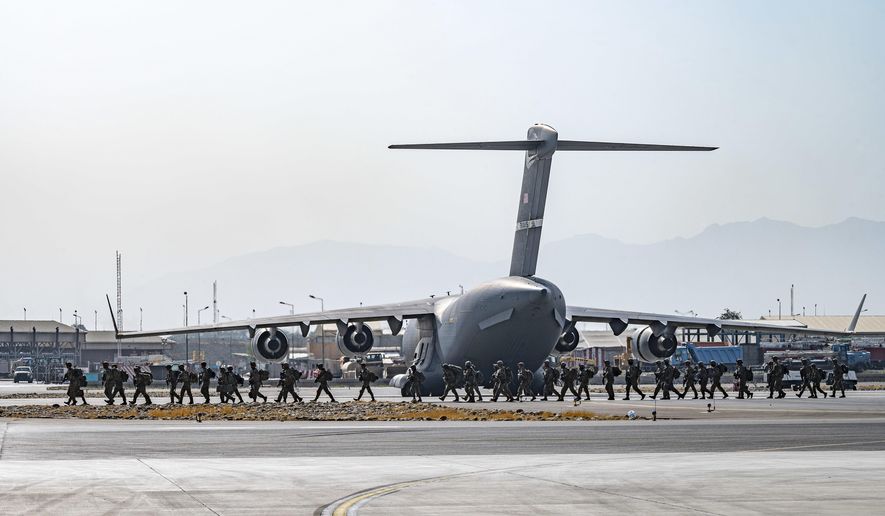The Biden administration this year has stepped up approvals of special visas for Afghan allies who assisted the American war effort, moving to recover from the catastrophe of last year’s chaotic U.S. troop withdrawal and collapse of the Afghan government.
The approval level was still below what the U.S. was doing in the months before the withdrawal, but still showed a decent recovery compared to the near-total collapse of the government’s ability to issue visas late last year.
With the U.S. diplomatic presence in Afghanistan still shut down, those seeking a visa must find a way to get to another country to go through final interviews and pick up their visas once approved. That’s a major hurdle for many Afghans who assisted the Americans and now face rough conditions, including lack of jobs, lack of food and shuttered borders.
The State Department approved 1,103 Special Immigrant Visas (SIV) for Afghans in the first three months of this year, with more than half — 683 — coming in March alone, according to numbers released by the lead inspector general overseeing U.S. counterterrorism efforts in Afghanistan.
By contrast, just 358 were approved in the final three months of last year.
“We remain committed to assisting Afghans who qualify for SIVs because they were employed by or on behalf of the U.S. government or by the International Security Assistance Force or its successor,” the State Department told The Washington Times in a statement.
SEE ALSO: Britain to send rocket launchers to Ukraine
SIVs were meant to protect and reward Afghans willing to work as translators or guides, or provide other key assistance to the American war effort. If they put in enough time, braving dangerous conditions and facing reprisal, they were to be granted a pathway to the U.S.
Analysts figure that perhaps 75,000 allies and their family members have been admitted under the SIV program since it began, but tens of thousands more are likely eligible.
The program had curtailed operations during the early days of the pandemic, but the Biden administration insists it was expanding operations as it prepared for last summer’s troop withdrawal. But the speed of the Afghan government’s collapse left the U.S. with no diplomatic assets in the country, and thus no way to complete the steps required to issue visas.
Only Afghans who can get to third-party countries are able to be interviewed and issued visas, the State Department said.
Since the program isn’t open to Afghans who reached the U.S., those brought out in the chaos of the U.S. airlift aren’t eligible to apply.
That rules out thousands who were lucky enough to get on the planes. They must now seek another status, such as filing for asylum, to gain a permanent foothold here.
Even as the administration was approving more visas, one complication did arise.
Federal officials brought charges in January against an officer in the Navy Reserves who they say accepted bribes to write recommendation letters for more than 20 Afghans whom he didn’t actually oversee.
Jeromy Pittmann, who held the rank of commander in the Reserve, signed more than 20 recommendations from 2018 to 2020 for Afghans, peppering them with details of their service to the U.S. military even though he didn’t have any personal knowledge to back them up.
“Pittmann submitted these letters even though he was not personally acquainted with the applicants, and his statements about the applicants were false and fraudulent when made,” Kevin Naylon, a special agent for the Special Inspector General for Afghanistan Reconstruction, told a federal court in an affidavit justifying the charges.
He provided excerpts of emails showing Mr. Pittmann discussed payments of $500 per recommendation.
The Times reached out to Mr. Pittmann’s lawyer for comment on the case.
Mr. Naylon said in his court filing that the State Department “implemented internal lookouts” for any applications Mr. Pittmann helped.
But the case is just the kind of fraud experts say could be running rampant among SIV applicants, and it’s a reason some have urged a more careful approach toward approving permanent status for fleeing Afghans.
Another danger exposed by the Defense Department’s inspector general came with shoddy vetting of the Afghan evacuees who did reach the U.S.
Despite administration assurances of hefty vetting before anyone made it here, investigators discovered some secret Defense Department databases weren’t being checked at first. When names were eventually run through those databases, the inspector general found dozens who were already released into the U.S.
“As a result of the [National Counterterrorism Center] not vetting Afghan evacuees against all available data, the United States faces potential security risks if individuals with derogatory information are allowed to stay in the country. In addition, the U.S. Government could mistakenly grant Special Immigrant Visa or parolee status to ineligible Afghan evacuees with derogatory information gathered from the DoD ABIS database,” the lead inspector general said.
Homeland Security has vigorously denied that the vetting was not complete but has yet to publicly reveal the reasons for its disagreement with the inspector general’s reporting.
• Stephen Dinan can be reached at sdinan@washingtontimes.com.




Please read our comment policy before commenting.